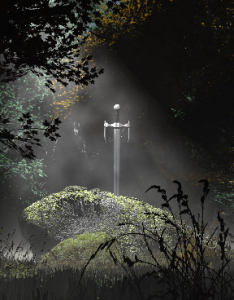 What do you do when you discover an ancient red dragon living in your neighbourhood? You get adventurers to kill it, of course. But what happens if the adventurers don’t kill the dragon? It will be angry that you tried to kill it and it will likely destroy your village. If only there was a way to keep sending adventurers against the dragon while avoiding the dragon’s wrath after each failed attempt. The inhabitants of Burrow’s Scar have come up with just such a plan. Unfortunately for your PCs, they are likely to be the next heroes tricked into face the dragon.
What do you do when you discover an ancient red dragon living in your neighbourhood? You get adventurers to kill it, of course. But what happens if the adventurers don’t kill the dragon? It will be angry that you tried to kill it and it will likely destroy your village. If only there was a way to keep sending adventurers against the dragon while avoiding the dragon’s wrath after each failed attempt. The inhabitants of Burrow’s Scar have come up with just such a plan. Unfortunately for your PCs, they are likely to be the next heroes tricked into face the dragon.
Tag: Dungeons and Dragons
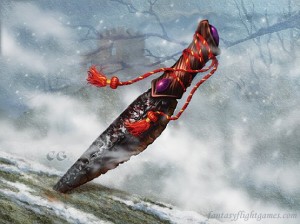 Dagger or long sword? Club or mace? Hand axe or executioner’s axe? Hand crossbow or great bow?
Dagger or long sword? Club or mace? Hand axe or executioner’s axe? Hand crossbow or great bow?
Which one should you select? What prompts you to select the weapon your PC wields in battle? Are you concerned with aesthetics? Or does the desire to roll as big a die as possible trump all other factors?
I must confess I’m often at a loss over what weapon to select. In the real world a dagger to my heart will kill me just as quickly as a long sword to the heart. Idea’s of d4s and d8s don’t really come into play. Granted a dagger cut to my arm is just that, a cut. A long sword on the other hand might take my arm off.
My Campaign Should Be On TV
My personal spin as a DM is to think of each individual gaming session as a television episode and have the overall arc of my campaign play like a television season. Television shows such as Xena: Warrior Princess, Hercules and Legend of the Seeker have a genre similar to that of Dungeons & Dragons and can provide some insight and ideas into your own campaign.
Here are some basic elements to keep your campaigns fresh so you don’t get “canceled” by your gaming group.
The Dungeon’s Master team welcomes Skallawag into the fold. Skallawag, Wimwick and Ameron have played D&D together for over 20 years. Since Dungeon’s Master launched, Skallawag has provided many insightful comments. It took some coaxing, but we finally convinced him to write an article. We hope that this is his first of many articles and that you find his perspective on D&D as helpful and insightful as we do.
Tavern Trappings
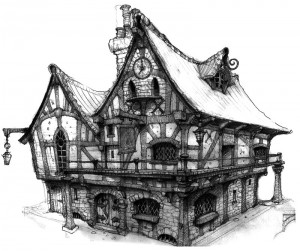 Last week we provided a list of 118 Tavern Names. In the article, Wimwick provided some good positioning around making a tavern more than just a typical, average, run-of-the-mill establishment. Giving it a name is an excellent start. But why stop there?
Last week we provided a list of 118 Tavern Names. In the article, Wimwick provided some good positioning around making a tavern more than just a typical, average, run-of-the-mill establishment. Giving it a name is an excellent start. But why stop there?
Considering how often PCs find themselves in taverns, it’s important that you take some time to make each one unique and memorable. You don’t have to spend hours on it; a few minutes will do the trick. Adding those little details brings the setting to life. Without these details your tavern is just a forgettable background. So before the PCs head to the next watering hole for a quick drink, take a minute to flesh it out a little bit. Using our list to find an appropriate tavern name is a great start, but don’t forget to describe the staff, the patrons and the décor.
D&D Encounters (Week 9)
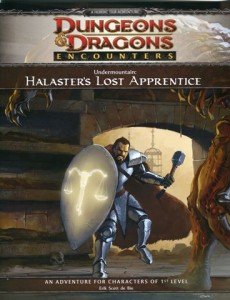 Before starting D&D Encounter week 9, I had a tough decision to make. Last week we had a total party kill (TPK). I had to decide if I wanted to resurrect my Gith Monk and keep playing him for the remaining four weeks or if I should play a totally different character? I weighed the pros and cons very carefully all week.
Before starting D&D Encounter week 9, I had a tough decision to make. Last week we had a total party kill (TPK). I had to decide if I wanted to resurrect my Gith Monk and keep playing him for the remaining four weeks or if I should play a totally different character? I weighed the pros and cons very carefully all week.
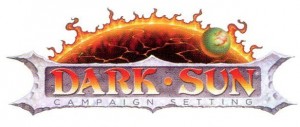 Dark Sun is coming later this year. In anticipation of the release of the next 4e campaign setting I’ve been doing my homework about the campaign setting. I never played Dark Sun when it was originally released, nor did I even purchase the box set. Though the setting looked interesting I never made the decision to get myself a copy. As a result I’ve apprehended Ameron’s copy and have been doing some reading.
Dark Sun is coming later this year. In anticipation of the release of the next 4e campaign setting I’ve been doing my homework about the campaign setting. I never played Dark Sun when it was originally released, nor did I even purchase the box set. Though the setting looked interesting I never made the decision to get myself a copy. As a result I’ve apprehended Ameron’s copy and have been doing some reading.
Athas always appeared as a very savage, destructive and hard land. This is what the artwork has led me to believe, reading other people’s thoughts on the setting and of course reading through the source books themselves.
Technology Is A Double Edged Sword
For the past five years the group at Dungeon’s Master have used MapTools as the primary means for displaying our combat encounters. To say that MapTools has changed the way we play the game would be an understatement. In a previous post, Desktop Killed The Tabletop Game, I wrote about how software like MapTools has the ability to change the way the entire hobby is played and I still believe that to be true. I believe that a blend of software and hardware, such as what the Surface Scapes project is doing, will also revolutionize the way we play our hobby. Perhaps not in its current form, but certainly we are seeing the beginnings of how technology can be applied to Dungeon & Dragons and bring our minis and maps to life.
When Players Kill the Campaign
Players inevitably do the unexpected. A good DM anticipates the most likely options and plans for them. After all there are only so many choices during a dungeon crawl. But what happens when the unexpected scenario involves the characters themselves and not the choices they make? How can a DM prepare for players who want to changes their characters without warning? How is the long-term camping affected when the players decide that they want to try something new?
I’m the first to admit that some character builds are stupidly powerful. These are usually the result of creative players scouring through character builder and looking for loopholes to exploit. I fall squarely into this camp. My feeling is that if I do my homework and find a really cool and atypical build that gives me an unexpected advantage then I deserve it. But every now and then a build or power gets used in a way that it clearly wasn’t designed for, and after much abuse Wizards steps in and updates the rules. The latest causality to befall this fate is the Daggermaster paragon path.
Earlier this week Wizards of the Coast released a sizable Rules Update (errata) and although it makes a bunch of powers and items clearer, it also closes the exploited loopholes in some build and powers. I know that I have three different LFR characters that need some significant rework following this update.
D&D Encounters (Week 8)
 You know what I’m really enjoying about D&D Encounters? Regardless of how long you’ve played D&D you get to experience a new aspect of D&D every week. This week I experienced my very first TPK. And so did everyone else at my FLGS.
You know what I’m really enjoying about D&D Encounters? Regardless of how long you’ve played D&D you get to experience a new aspect of D&D every week. This week I experienced my very first TPK. And so did everyone else at my FLGS.
After last week’s encounter, I was less than 100 XP from leveling. I was so close I could taste it. All week I kept thinking that after this encounter I’ve finally be level 2. It took eight long weeks, but after tonight I’d reap the rewards of sticking with my original character. And then I died.